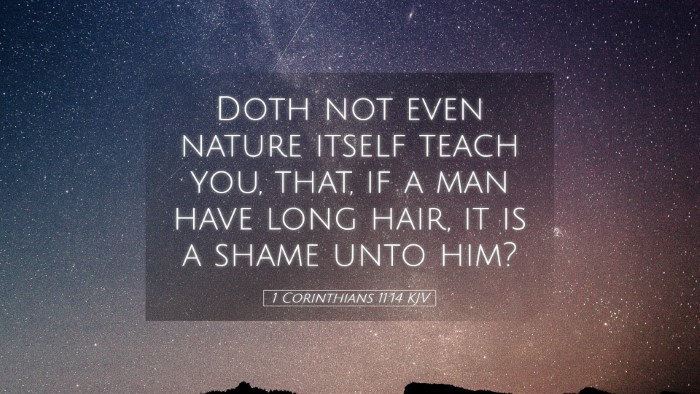Commentary on 1 Corinthians 11:14
1 Corinthians 11:14 states, "Doth not even nature itself teach you, that, if a man have long hair, it is a shame unto him?" This passage speaks to the cultural and theological backdrop of the Corinthian church as well as the principles of propriety in worship and the nature of gender distinctions.
Contextual Overview
This verse is placed within a broader discussion about head coverings, authority, and gender roles in the context of worship. Understanding the cultural context of Corinth during Paul’s time is essential to provide clarity to this teaching.
- Historical Context: Corinth was a melting pot of various cultures and philosophies, which led to diverse practices in worship. Paul addresses not only the issues of order but also the underlying principles that govern Christian behavior.
- Nature and Culture: The appeal to nature indicates that Paul is not merely relying on cultural norms but is pointing to an inherent understanding of propriety that transcends cultural differences.
Theological Insights
Commentators like Matthew Henry assert that Paul’s argument reflects the established norms of his time. He points out that God created distinctions in gender which are essential for social order. Long hair on men was generally seen as a sign of vanity or rebellion against God’s design.
Albert Barnes notes that the argument is not one against long hair itself but emphasizes the shame associated with it in that cultural context. The reference to "nature" suggests that there are indeed God-ordained distinctions, and deviations from these can lead to a loss of witness among believers.
Interpretive Perspectives
This verse has been interpreted in several ways, which highlights the complex interplay between cultural practices and theological mandates.
- Cultural Interpretation: Many scholars agree that Paul’s instructions were deeply rooted in the cultural norms of his day. Adam Clarke elaborates on this by saying that Paul’s instructions were not meant to be universally prescriptive but rather relevant to the societal framework of the Corinthians.
- Theological Implications: The theological implications are profound, suggesting that the natural order reflects God’s design. Long hair on men signifies disorder which contradicts the creation order, hence reducing their effectiveness as leaders in the Christian community.
Pastoral Applications
For contemporary pastors and theologians, 1 Corinthians 11:14 poses vital questions regarding the interaction between culture and Scripture. Here are a few applications to consider:
- Understanding Cultural Context: Pastors should be sensitive to the cultural contexts of their communities while also holding to Scriptural truths that guide behavior within the church.
- Gender Distinctions: The verse challenges current cultural narratives about gender. Preaching on this passage should encourage believers to embrace their God-given identities and roles responsibly.
- Worship Practices: Church leaders are reminded to examine how cultural expressions in worship can either uphold or undermine the teachings of Scripture, particularly with regard to propriety and order.
Conclusion
In conclusion, 1 Corinthians 11:14 serves as a critical reminder of the importance of understanding God's design for gender roles, the implications of cultural practices, and the need for the church to witness faithfully in every generation. As this scripture is explored, it calls for reflection on how deeply the truths of Scripture are rooted in the created order, challenging believers to align their lives with God’s intentions.


